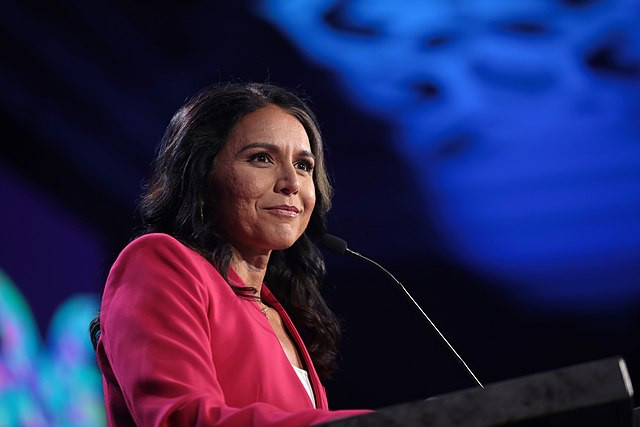Nearly one hundred former national security officials are urging the U.S. Senate to conduct closed-door hearings on President-elect Donald Trump's nominee for director of national intelligence (DNI), former Rep. Tulsi Gabbard. In a letter addressed to incoming Senate Majority Leader John Thune (R., S.D.) and current Majority Leader Chuck Schumer (D., N.Y.), the signatories expressed alarm over Gabbard's track record and foreign-policy views, arguing that lawmakers should carefully evaluate classified materials on her background before any confirmation vote.
"Several of Ms. Gabbard's past actions call into question her ability to deliver unbiased intelligence briefings to the President, Congress, and to the entire national security apparatus," the letter stated. The group of ex-officials referenced Gabbard's 2017 trip to Syria, during which she met President Bashar al-Assad, as well as her comments casting doubt on widely accepted assessments of his use of chemical weapons. "Her sympathy for dictators like Vladimir Putin and Assad raises questions about her judgement and fitness," the letter added.
Since the creation of the DNI role in 2004, nominees have typically possessed significant executive branch experience or deep exposure to the intelligence community. Gabbard's critics note that, if confirmed, she would be "the least experienced" person to hold the position. The letter contended that her background as a former Democratic House member and lack of executive oversight experience warrants extra scrutiny, particularly given the responsibilities of overseeing 18 intelligence agencies, including the CIA and FBI.
The letter's signatories include numerous former senior officials, among them Wendy Sherman, Ian Kelly, and Eric Green-figures who served under both Democratic and Republican administrations. They called for "Senate committees [to] consider in closed sessions all information available to the U.S. government when considering Ms. Gabbard's qualifications," suggesting that any undisclosed intelligence should be weighed before granting her authority over the nation's secretive apparatus.
Echoing these concerns, the former officials pointed to Gabbard's stance on Ukraine following Russia's invasion, noting her calls for Ukraine to be a "neutral country" and what some view as overt sympathy for adversarial regimes. Her skepticism toward longstanding U.S. intelligence conclusions has only heightened worries that she might politicize analysis or undermine allies' trust in America's intelligence-sharing commitments.
A spokesperson for Gabbard on the Trump transition team dismissed these criticisms. "These unfounded attacks are from the same geniuses who have blood on their hands from decades of faulty 'intelligence,' including the non-existent weapons of mass destruction," said spokesperson Alexa Henning. "These intel officials continue to use classification as a partisan weapon to smear and imply things about their political enemy without putting the facts out."
Gabbard is not the only Trump nominee facing headwinds in the confirmation process. Pete Hegseth, tapped to lead the Defense Department, confronts questions stemming from alleged sexual misconduct and excessive drinking. Meanwhile, Robert F. Kennedy Jr., nominated to run the Department of Health and Human Services, faces opposition over his views on vaccines.
Former Rep. Matt Gaetz's withdrawal from consideration for attorney general-amid his own controversies-has shown that scrutiny of Trump's picks can be intense, and some nominees fail to survive the vetting gauntlet. The Gabbard case may follow a similar trajectory if senators prove unwilling to overlook her foreign policy positions and past commentary.
For now, the Senate leadership has not publicly committed to holding closed hearings on Gabbard's nomination. However, as the letter circulates among lawmakers and attracts media attention, calls for additional transparency and thorough review may become harder to ignore.






